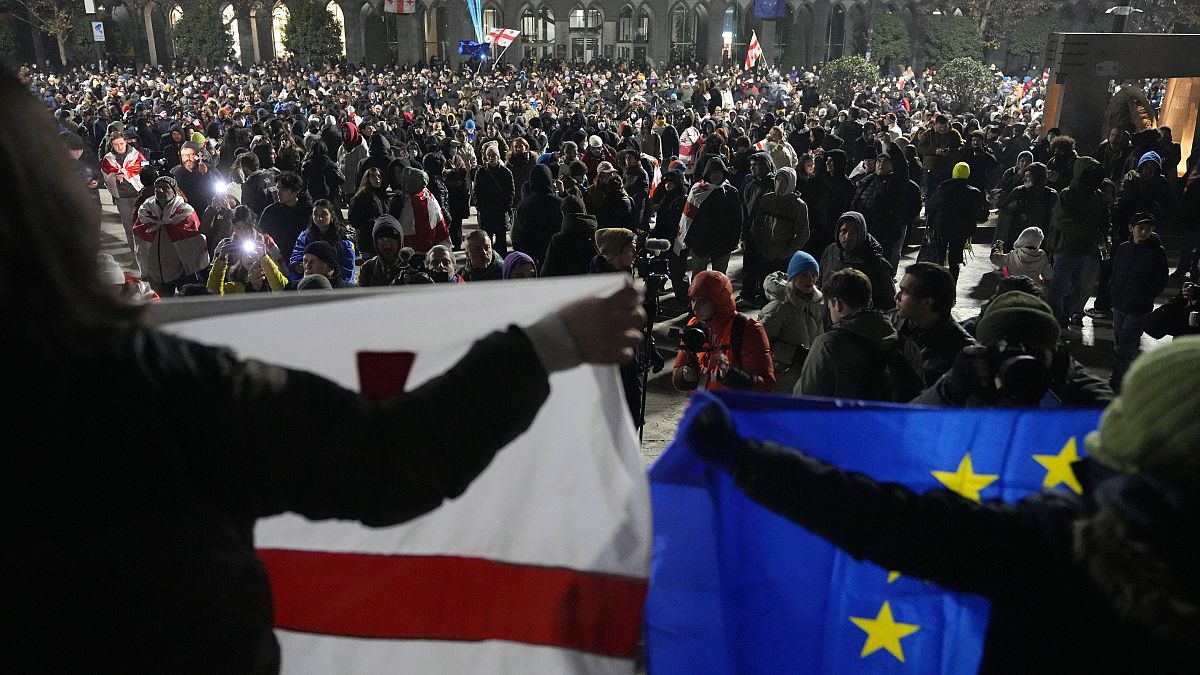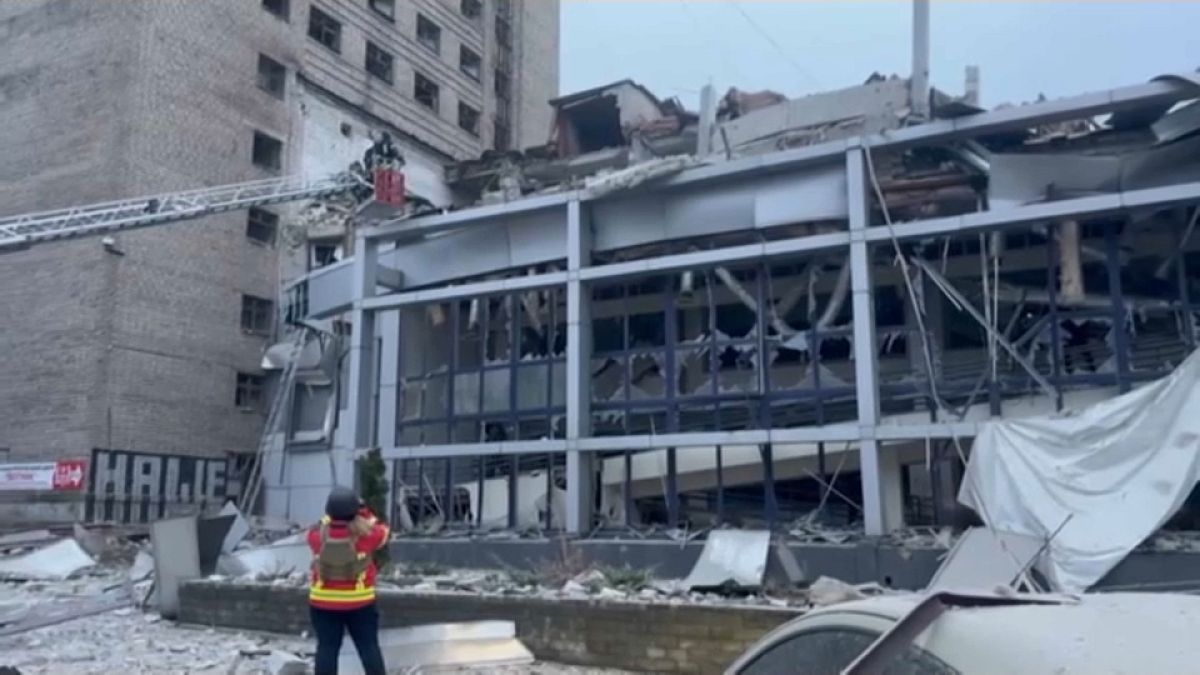World
EU imports of Russian oil plunge by 90% as a result of sweeping bans
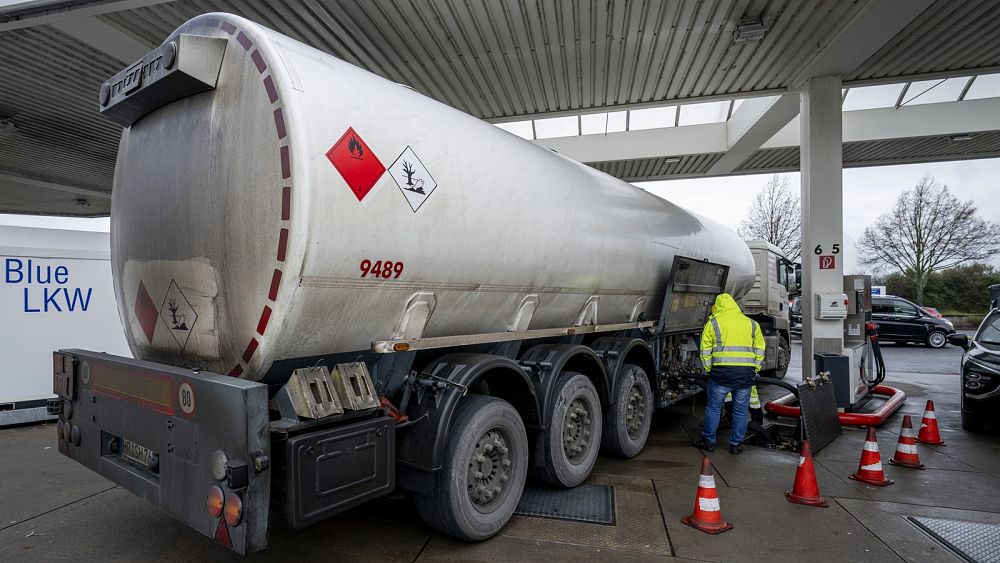
It’s official: the European Union is no longer the top client of Russian oil.
As a result of the sweeping bans imposed in reaction to the Ukraine war, the bloc’s imports of Russian oil have plunged by 90% in the span of one single year.
In February 2022, the same month the Kremlin launched the full-scale invasion, the EU bought 15.189 million tonnes (Mt) of Russian crude oil and refined products, such as diesel, kerosene and gasoline.
One year later, in February 2023, those same imports totalled 1.876 Mt. The following month, in March, they fell further to reach 1.445 Mt.
The massive gap left by Russia has been filled by a variety of countries, including the United States, Norway, Algeria, Brazil, Angola and the United Arab Emirates.
The numbers, released on Monday by Eurostat, expose the effects of the far-reaching ban on Russian oil that EU leaders agreed to impose in late May after hard-fought negotiations.
The prohibition was two-fold as it applied to both seaborne crude oil and seaborne refined products, and entered into force on 5 December and 5 February, respectively.
The timeline was designed to help member states adapt to the radical transformation and the banishment of their top energy supplier.
The measure, however, exempted oil imports through the Druzhba pipeline upon the request of landlocked countries in Central Europe, most notably Hungary, whose demands delayed the ban’s final approval.
In fact, the country-by-country breakdown of the March data shows the majority of Russian crude oil went to the three countries physically connected by Druzhba: Hungary, Slovakia and the Czech Republic.
EU leaders had promised to revisit the controversial Druzhba derogation, which was set as indefinite in time, but the issue remains untouched.
“Total oil imports from Russia did not reach zero due to certain exceptions outlined in the bans, which allow for limited imports under specific conditions,” Eurostat said in its press release.
The turmoil triggered by Russia’s invasion sparked turmoil in the energy sector, prompting member states to release a share of their emergency oil reserves in a bid to calm down market prices.
According to Eurostat, as of March 2023, only five member states – Bulgaria, Czechia, Ireland, Latvia and Lithuania – were still below the national minimum level of emergency oil stocks.

World
Memes, Jokes and Cats: South Koreans Use Parody for Political Protest

As South Koreans took to the streets this month demanding the ousting of their president, some found an unexpected outlet to express their fury: jokes and satire.
They hoisted banners and flags with whimsical messages about cats, sea otters and food. They waved signs joking that President Yoon Suk Yeol’s declaration of martial law had forced them to leave the comfort of their beds. Pictures of the flags spread widely on social media.
The idea was to use humor to build solidarity against Mr. Yoon, who has vowed to fight his impeachment over his ill-fated martial law decree on Dec. 3. Some waved flags for nonexistent groups like the so-called Dumpling Association, a parody of real groups like labor unions, churches or student clubs.
Video by Yu Young Jin/The New York Times
Photos by Weiyi Cai/The New York Times
“I just wanted to show that we were here as part of the people even if we aren’t actually a part of a civic group,” said Kim Sae-rim, 28, who waved the flag of the dumpling group at a recent protest she went to with friends. Some groups referred to other local favorites like pizza and red bean pastries.
Kwon Oh-hyouck, a veteran protester, said that he had first seen such flags emerge during demonstrations in 2016 and 2017 that ultimately resulted in the removal of President Park Geun-hye. Mr. Kwon said that satire was part of the Korean spirit of protest.
“People satirize serious situations, even when those in power come out with guns and knives,” he said. “They are not intimidated.”
In the past month, protesters have come up with a wide range of unorthodox groupings. Some were self-proclaimed homebodies. Still others came together as people who suffered from motion sickness.
Video by Chang W. Lee/The New York Times
Photos by Weiyi Cai/The New York Times
Video by Weiyi Cai/The New York Times
Photo by Chang W. Lee/The New York Times
Lee Kihoon, a professor of modern Korean history at Yonsei University in Seoul, said that he believed the flags at this month’s protests were an expression of the diversity of people galvanized by the president’s attempt to impose military rule.
“They’re trying to say: ‘Even for those of us who have nothing to do with political groups, this situation is unacceptable,’” he said. “‘I’m not a member of a party or anything, but this is outrageous.’”
Some held signs ridiculing Mr. Yoon, saying that he had separated them from their pets at home and disrupted their routine of watching Korean dramas. One group called itself a union of people running behind schedule, referring to the idea that the need to protest over martial law had forced them to reschedule their appointments.
Photo by Weiyi Cai/The New York Times
Photo by Chang W. Lee/The New York Times
And of course, there were animals, both real and fake.
Photos by Weiyi Cai/The New York Times
South Koreans have shown that protests for serious causes — like the ousting of a president — can still have an inviting, optimistic and carnival-like atmosphere.
“I don’t know if the protesters realize it, but even though they’re angry, they haven’t gotten solemn, heavy or moralistic,” Mr. Lee said. “The flags have had an effect of softening and relaxing the tension.”
On the day that lawmakers voted to impeach Mr. Yoon, protesters who were K-pop fans brought lightsticks to rallies and danced to pop songs blasting from speakers. “Even though this is a serious day,” said Lee Jung-min, a 31-year-old fan of the band Big Bang, “we might as well enjoy it and keep spirits up.”
Video by Chang W. Lee/The New York Times
World
Two US Navy pilots shot down over Red Sea in apparent 'friendly fire' incident: US military

Two U.S. Navy pilots were shot down Sunday over the Red Sea in what appeared to be “friendly fire”, the U.S. military said.
The pilots were found alive after they ejected from their aircraft, with one suffering minor injuries.
The incident demonstrates the pervasive dangers in the Red Sea corridor amid ongoing attacks on shipping by the Iranian-backed Houthis, even as U.S. and European military coalitions patrol the area.
The U.S. military had conducted airstrikes targeting Yemen’s Houthi rebels at the time, but U.S. Central Command did not elaborate on what their mission was.
US NAVY SHIPS REPEL ATTACK FROM HOUTHIS IN GULF OF ADEN
A fighter jet maneuvers on the deck of the USS Dwight D. Eisenhower in the Red Sea, June 11, 2024. (AP)
The military said the aircraft shot down was a two-seat F/A-18 Super Hornet fighter jet assigned to the “Red Rippers” of Strike Fighter Squadron 11 out of Naval Air Station Oceana, Virginia.
The F/A-18 shot down had just flown off the deck of the USS Harry S. Truman aircraft carrier, according to Central Command. On Dec. 15, Central Command said the Truman had entered the Mideast, but did not specify that the carrier and its battle group were in the Red Sea.
“The guided missile cruiser USS Gettysburg, which is part of the USS Harry S. Truman Carrier Strike Group, mistakenly fired on and hit the F/A-18,” Central Command said in a statement.
It is unclear how the Gettysburg had mistaked an F/A-18 for an enemy aircraft or missile, particularly since ships in a battle group are linked by radar and radio communication.
US MILITARY CONDUCTS SUCCESSFUL AIRSTRIKES ON HOUTHI REBEL FORCES IN YEMEN
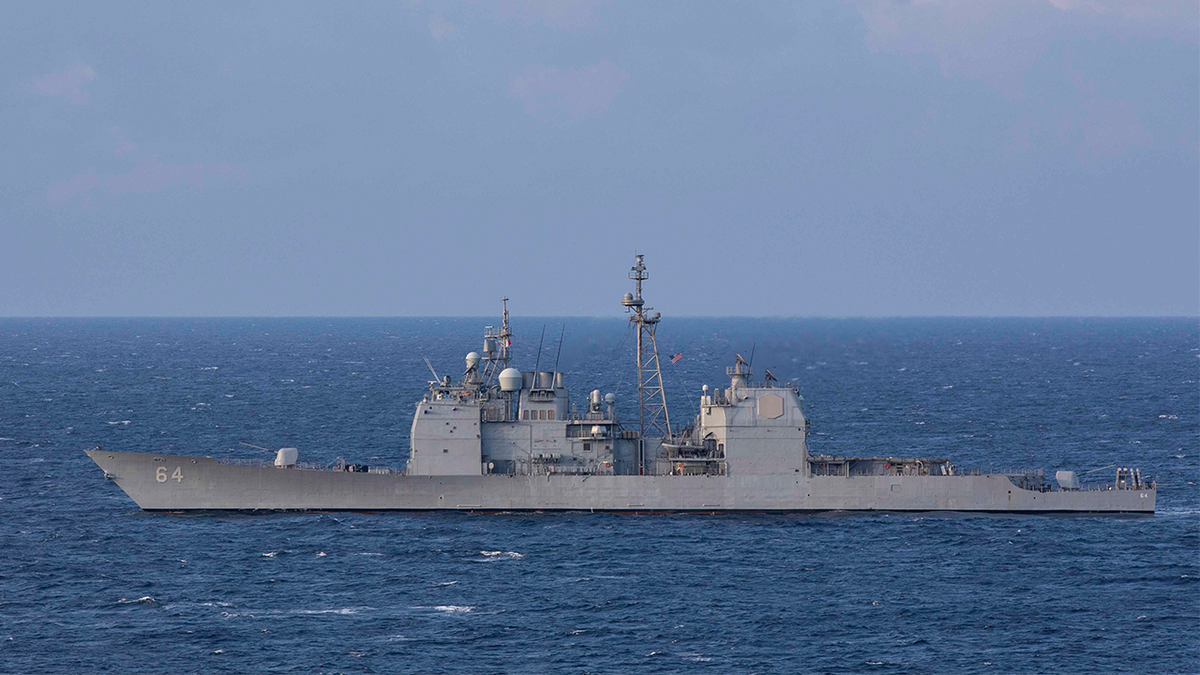
The Ticonderoga-class guided-missile cruiser USS Gettysburg (CG 64) steams in the Mediterranean Sea, Dec. 15, 2024. (AP)
Central Command said that warships and aircraft earlier shot down multiple Houthi drones and an anti-ship cruise missile launched by the rebels. Fire from the Houthis has previously forced sailors to make decisions in seconds.
The U.S., since the Truman arrived, has ramped up its airstrikes targeting the Houthis and their missile fire into the Red Sea and the surrounding area. But an American warship group in the region may lead to additional attacks from the rebels.
On Saturday night and into Sunday, U.S. warplanes conducted airstrikes that shook Yemen’s capital of Sanaa, which the Houthis have held for a decade. Central Command said the strikes targeted a “missile storage facility” and a “command-and-control facility.”
Houthi-controlled media reported strikes in both Sanaa and around the port city of Hodeida, but did not disclose details on any casualties or damage.
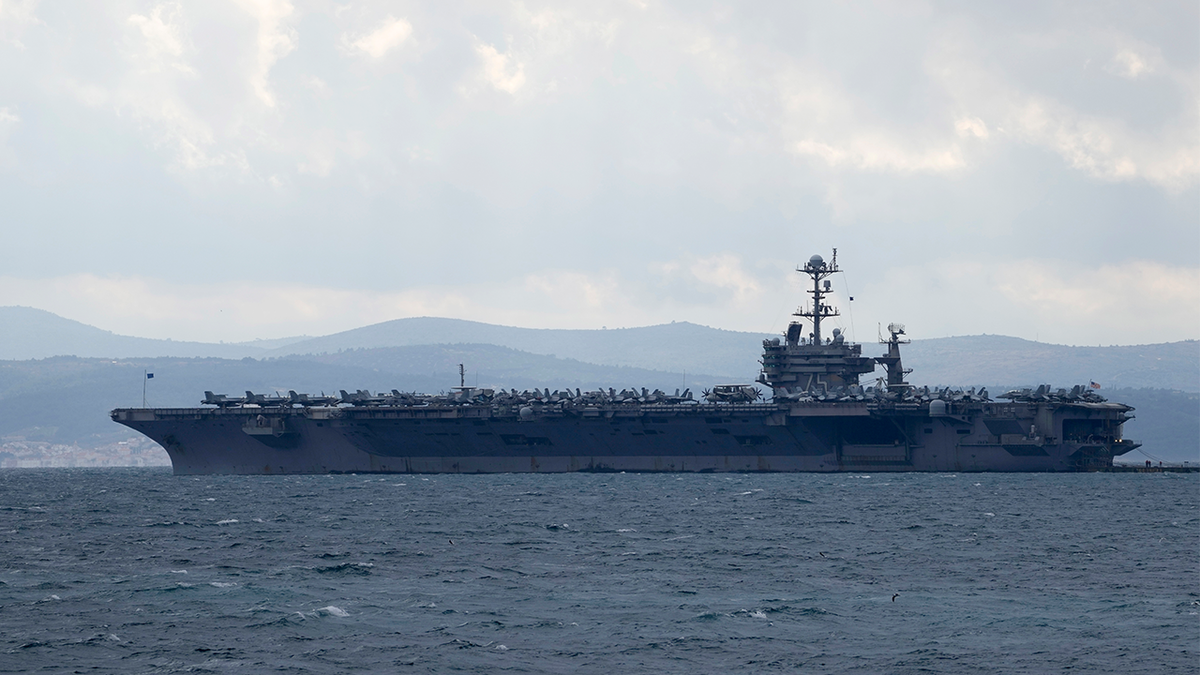
Aircraft carrier USS Harry S. Truman is moored near Split, Croatia, Feb. 14, 2022. (AP)
The Houthis later acknowledged the aircraft being shot down in the Red Sea.
Since the start of the Israel-Hamas war in October of last year, the Houthis have targeted about 100 merchant vessels with missiles and drones.
The rebels say that they target ships linked to Israel, the U.S. or the U.K. to force an end to Israel’s war against Hamas in Gaza, which began after Hamas’ surprise attack against Israel on Oct. 7, 2023, although many of the ships the rebels have attacked have little or no connection to the ongoing war, including some headed for Iran.
The Houthis also have increasingly targeted Israel with drones and missiles, leading to retaliatory airstrikes from Israeli forces.
The Associated Press contributed to this report.
World
AfD party calls for big rally after Germany's Christmas market attack

Leading right-wing figures in Europe have also weighed in, criticising the German authorities for failing to take stronger preventative action.
German far-right political party Alternative for Germany (AfD) is calling for a major rally following the attack at a Christmas market in Magdeburg which left several people dead and hundreds injured.
At a memorial site for the victims, AfD co-leader Tino Chrupalla called on Interior Minister Nancy Faeser to take stronger action to ensure the safety of the German public.
“I am now demanding answers from the interior minister: What is actually going on here in this country? What is actually happening in this country? We put up with it week after week, we put up with attacks, we put up with murders of our own people. This has to be cleared up now, and these phrases from politicians that things can’t go on like this, which I’ve heard again today, are actually upsetting,” Chrupalla told the press at the site.
Experts are now raising concerns that far-right groups could exploit the tragedy to fuel their anti-immigration rhetoric after police identified the assailant as a doctor from Saudi Arabia.
“Magdeburg is in eastern Germany where the support for the AfD is quite high. So, in elections usually, they have in the region more than one-third of the votes. So about 30% of the votes in the city, not as much as in the rural areas around,” says Matthias Quent, Professor of Sociology at Magdeburg-Stendal University of Applied Sciences.
“The region in general, eastern Germany, is a hotspot of far-right mobilisations. And we are facing election campaigns until the federal elections in February. And so this is not just a critical time because of Christmas and the trust that gets destroyed by such an attack but, also, regarding questions of disinformation and polarisation and the spread of hate that will and could happen over these kinds of attacks now,” he added.
Leading right-wing figures in Europe have also weighed in, criticising the German authorities for failing to take stronger preventative action.
Hungarian Prime Minister Viktor Orbán drew a direct link between immigration and Friday’s deadly attack in Germany, telling a news conference on Saturday, “These phenomena have only existed in Europe since the start of the migration crisis. So there is no doubt that there is a link between the changed world in Western Europe, the migration that flows there, especially illegal migration and terrorist acts.”
However, Quent explains that this particular case becomes more complex as further details emerge on the background of the attacker.
Investigators have found that the perpetrator had tried to build connections to far-right organisations in Germany and the UK, including Germany’s far-right AfD party as well as Tommy Robinson, the founder of the far-right English Defence League.
“So it’s a very complicated case we are facing here. And it’s not an Islamist attack. It’s quite sure, a kind of anti-Islam. More like far-right attacks than any other, if you want to search a kind of context on the political radar,” Quent says.
Identified by local media as 50-year-old Taleb A., a psychiatry and psychotherapy specialist, authorities said he had been living in Germany for two decades.
Taleb’s alleged X account is filled with tweets and retweets focusing on anti-Islam themes and criticism of the religion while sharing congratulatory notes to Muslims who left the faith.
He also described himself as a former Muslim.
He was critical of German authorities, saying they had failed to do enough to combat the “Islamism of Europe.”
-

 Politics1 week ago
Politics1 week agoCanadian premier threatens to cut off energy imports to US if Trump imposes tariff on country
-
/cdn.vox-cdn.com/uploads/chorus_asset/file/25789444/1258459915.jpg)
/cdn.vox-cdn.com/uploads/chorus_asset/file/25789444/1258459915.jpg) Technology1 week ago
Technology1 week agoOpenAI cofounder Ilya Sutskever says the way AI is built is about to change
-

 Politics1 week ago
Politics1 week agoU.S. Supreme Court will decide if oil industry may sue to block California's zero-emissions goal
-
/cdn.vox-cdn.com/uploads/chorus_asset/file/25546252/STK169_Mark_Zuckerburg_CVIRGINIA_D.jpg)
/cdn.vox-cdn.com/uploads/chorus_asset/file/25546252/STK169_Mark_Zuckerburg_CVIRGINIA_D.jpg) Technology1 week ago
Technology1 week agoMeta asks the US government to block OpenAI’s switch to a for-profit
-

 Business1 week ago
Business1 week agoFreddie Freeman's World Series walk-off grand slam baseball sells at auction for $1.56 million
-
/cdn.vox-cdn.com/uploads/chorus_asset/file/23951353/STK043_VRG_Illo_N_Barclay_3_Meta.jpg)
/cdn.vox-cdn.com/uploads/chorus_asset/file/23951353/STK043_VRG_Illo_N_Barclay_3_Meta.jpg) Technology1 week ago
Technology1 week agoMeta’s Instagram boss: who posted something matters more in the AI age
-
News1 week ago
East’s wintry mix could make travel dicey. And yes, that was a tornado in Calif.
-
/cdn.vox-cdn.com/uploads/chorus_asset/file/24924653/236780_Google_AntiTrust_Trial_Custom_Art_CVirginia__0003_1.png)
/cdn.vox-cdn.com/uploads/chorus_asset/file/24924653/236780_Google_AntiTrust_Trial_Custom_Art_CVirginia__0003_1.png) Technology1 day ago
Technology1 day agoGoogle’s counteroffer to the government trying to break it up is unbundling Android apps


